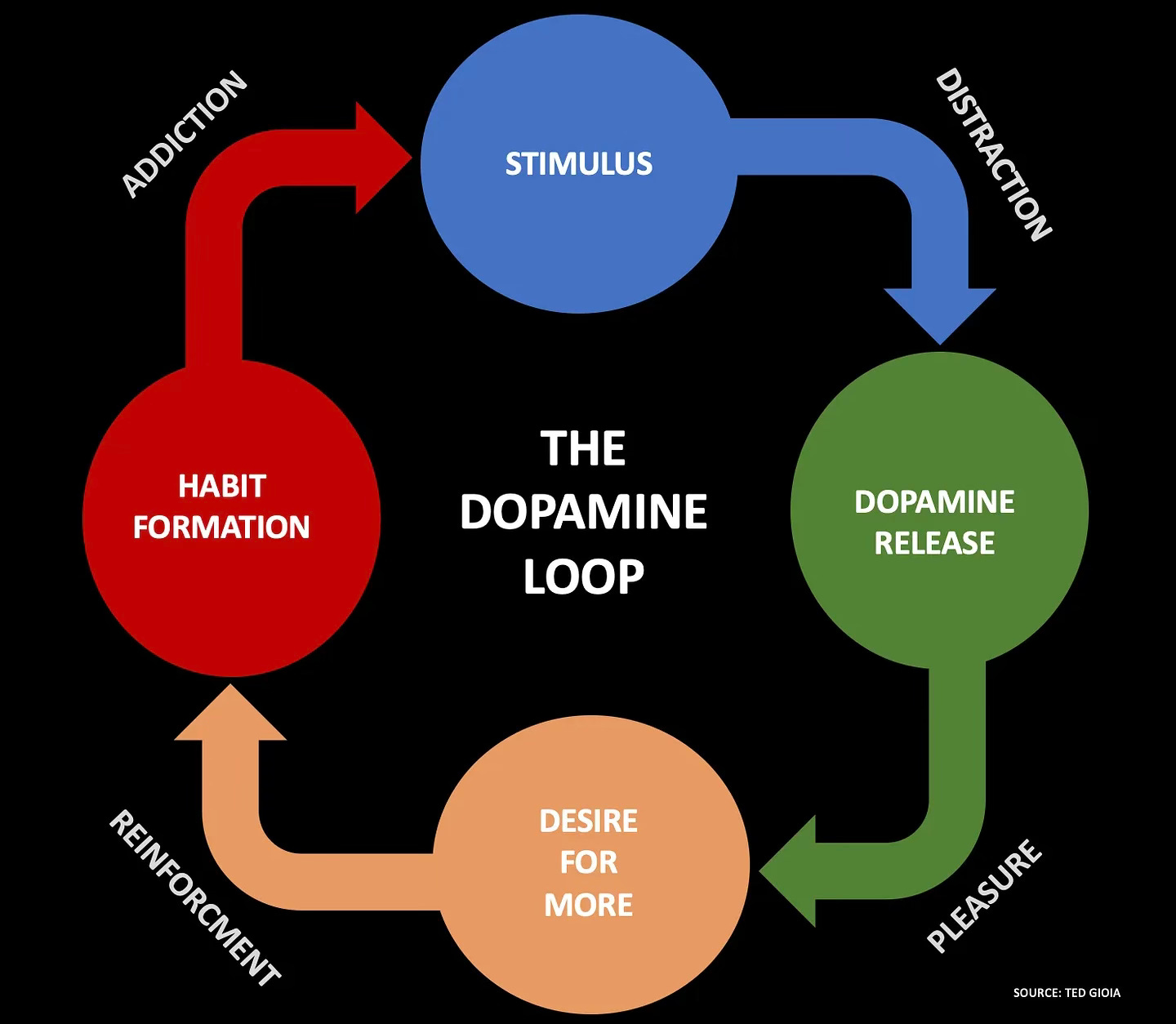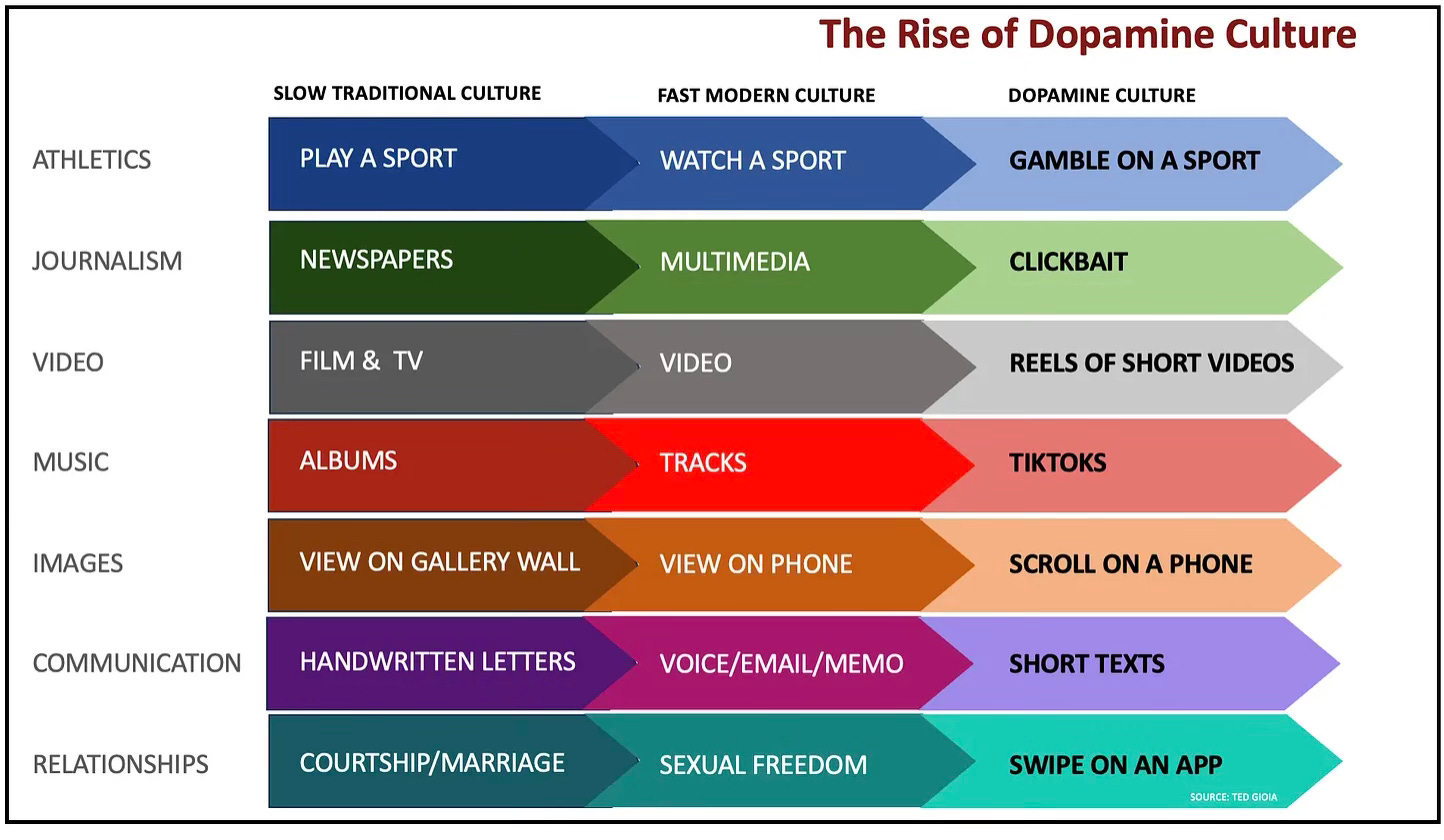The Dumbing Down of Culture: A Call to Action
Learn how shifts in content consumption are impacting our social structures, personal health, and what a pro-progress movement is doing to counter that
I’m a firm believer in problem identification as a key to making progress in government work. In my experience, the public isn’t interested in whatever interesting or cool solution you’re proposing until you’ve first convinced them there’s a real problem in need of fixing. In that spirit, today’s TL;dr features a couple of takes on what currently ails us, culturally and politically (the two are becoming more enmeshed, alas), as well as a look at a new movement that focuses on the real progress we’re making addressing humanity’s challenges. Let’s take a look-see, shall we?
The State of the Culture, 2024. Or a glimpse into post-entertainment society (it's not pretty)
Ted Gioia writes a popular Substack newsletter, The Honest Broker, that covers music, books, arts, media, and culture. In February he delivered his annual “State of the Culture” post. For 2024, he critiques the troubling evolution of mainstream culture toward a “post-entertainment” society dominated by distraction and addiction fueled by social media platforms.
Shift to Addiction-Based Consumption: Gioia says social media platforms prioritize short, repetitive content that engages users in a continuous loop. “Addiction is the goal,” he writes. The platforms are all shifting “to scrolling and reeling interfaces where stimuli optimize the dopamine doom loop. Anything that might persuade you to leave the platform—a news story, or any outside link—is brutally punished by their algorithms.” He provides a chart to explain.
Welcome To Our New, Dumbed-Down Culture: “Even the dumbest entertainment looks like Shakespeare compared to dopamine culture,” he writes. “You don’t need Hamlet, a photo of a hamburger will suffice. Or a video of somebody twerking, or a pet looking goofy.” The new goal for artists and content creators is to “provide just enough for a dopamine hit, and no more.” Gioia provides another chart that illustrates how this plays out across various aspects of society.
3. Ugly Implications for Health, Society: The rise of this new media culture has profound psychological impacts, leading to conditions like anhedonia (inability to feel pleasure) and general dissatisfaction, which Gioia dubs “Silicon Valley zombification.” The insidious nature of the problem has serious consequences for our ability to deal with a world getting more complicated by the day. “It’s a bigger issue than just struggling artists or floundering media companies,” he writes. “The dopamine cartel is now aggravating our worst social problems—in education, in workplaces, and in private life.” And, I would add, government. Which leads us to the next TL;dr ...
The Rise of Toxic Naïveté
Longtime political journalist Joe Klein — he was a columnist at Time magazine when that was a big deal — is now on Substack. In his latest post, he used Donald Trump’s widely-mocked “Gettysburg address” as a jumping off point to critique the current American cultural landscape, where expressing outrage seems more credible than positive discourse.
Pervasive Negativity on the Right: Klein points out the difficulty Trump and similar figures have in expressing anything positive or visionary. “The old adage—if you don’t have something nice to say, better to say nothing at all—has been turned on its head,” he writes. “If you don’t have something evil to say, you have no credibility. This has become a national plague, a disease.”
And on the Left: Klein notes the unhinged expressions of hate run on both sides of the political spectrum. He cited the “leftist ninnies who stormed a New York subway train, hassling Jews and chanting: ‘Iran You Make Us Proud.’”
Yet, We’ve Never Had It So Good: The downbeat rhetoric belies it’s a pretty good time to live in America. Klein writes: “Here we are, the most privileged people in the history of the world, thriving in a country that people are crashing our borders to live in … and we find it near-impossible to toot our own horns, to assay optimism, even a little.” On that note, let’s move on to groups dedicated to looking at the world through a different lens.
Progress, Rediscovered: A new movement promoting scientific, technological, and economic solutions to humanity's problems emerges
In the May issue of Reason, Ronald Bailey introduces a new pro-progress movement. He opens the piece with a quote from one of the founders of this movement, Jason Crawford: “The tragedy of today is that we are the heirs and the beneficiaries of thousands of years of progress and we take it for granted.” From waking up in a soft bed to working in air-conditioned spaces to chilling with Netflix at night, we enjoy it all “without giving a second thought to where it all came from or how, or how challenging it was to bring all of those amazing inventions into the world.”
Redefinition of Progress: The article describes a shift in the understanding of progress, moving away from a purely political or redistributive approach toward a focus on tangible technological and economic advancements. “It celebrates humanity’s achievements so far,” Bailey writes. “It judges progress not in technocratic terms but with an eye on outcomes for individual human beings.”
Cultural Pessimism vs. Optimistic Action: Bailey notes a widespread cultural pessimism about the future, underscored by bleak scientific predictions and public sentiment. In contrast, the pro-progress movement seeks to counter this negativity by promoting an optimistic view of human capability and highlighting successful interventions and innovations that have significantly improved quality of life globally. For example, the Progress Network “highlights stories detailing the actuality of progress from around the world that get kind of buried under the avalanche of negative stories through its What Could Go Right? podcast, a daily newsletter, and social media.” Sound familiar, GGF readers?
Strategic Approaches to Foster Progress: The movement is characterized by strategic efforts to cut through regulatory red tape and foster innovation through practical interventions. One effort is the embrace of narrative. “You can’t tell people that they should feel better just because the data tells them they should,” is how Zachary Karabell, founder of the Progress Network, puts it. Crawford, founder of Roots of Progress, agrees: “Narratives have a lot of power and they have more power than charts and graphs.” GGF seconds that emotion.
Bailey concludes his article with these quotes on optimistic realism:
These proponents of progress do not think that they will change the world overnight. “You have to create a critical mass,” says Karabell, “and ideas take a long time to have an effect on society. But things do change, cultural attitudes do change.” …
“Pessimism is more arrogant than optimism,” Karabell concludes. “Optimism is simply that we know for a fact that we are capable of solving problems. Pessimism is the conviction that we are not. The future isn’t worse unless people stop trying to make it better.”
In Other’s Words
H/T to James Clear’s 3-2-1 newsletter for today’s quotes.
Writer and scholar C.S. Lewis on what why small choices matter:
Good and evil both increase at compound interest. That is why the little decisions you and I make every day are of such infinite importance. The smallest good act today is the capture of a strategic point from which, a few months later, you may be able to go on to victories you never dreamed of. An apparently trivial indulgence in lust or anger today is the loss of a ridge or railway line or bridgehead from which the enemy may launch an attack otherwise impossible.
Source: Mere Christianity
Entrepreneur and investor Paul Graham on fooling yourself:
If you’re trying to choose between two theories and one gives you an excuse for being lazy, the other one is probably right.
Source: What You'll Wish You'd Known
Author James Clear on the timing of feedback.
Early feedback is usually better than late criticism. Delaying the conversation or stringing someone along with indirect feedback won't make them feel better once the real issue is finally addressed. Nobody likes getting bad news, but everyone appreciates clarity.
Onward and Upward.






